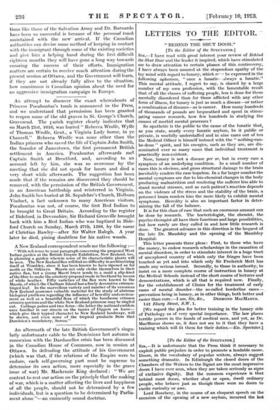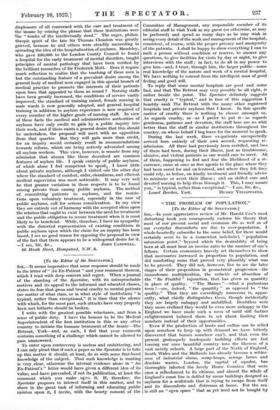[To the Editor of the SPECTATOR.]
Sus,—It is unfortunate that the Press think it necessary to exploit public prejudice in order to promote a laudable cause. Doors, in the vocabulary of popular writers, always suggest something dramatic. In Edinburgh the closed doors of the Chambers of the Writers to the Signet are the most impressive doors I have ever seen, when they are taken seriously as signs of exclusive dignity. But the common experience is that behind most doors, whether shut or open, dwell ordinary people, who behave just as though there were no doors to excite curiosity or awe.
Lord Rosebery, in the course of an eloquent speech on the occasion of the opening of a- new asylum, incurred the hot displeasure of all concerned with the care and treatment of the insane by coining the phrase that these institutions were the " tombs of the intellectually dead." The eager, philan- thropic spirit of the late Sir Thomas Clouston was greatly grieved, because he and others were steadily succeeding in spreading the idea of the hospitalization of asylums. Maudsley, who gave £30,000 to the London County Council to found a hospital for the early treatment of mental disorders, taught principles of mental pathology that have been verified by the brilliant researches of Sir Frederick Mott. Does it require much reflection to realize that the teaching of these men is but the outstanding feature of a prevalent desire among the general body of medical men engaged in this special branch of medical practice to promote the interests of their patients upon lines that appealed to them as sound ? Nursing staffs have been greatly increased, the conditions of service vastly improved, the standard of training raised, female nursing in male wards is now generally adopted, and general hospital training in addition to asylum experience is now required of every member of the higher grade of nursing staff. In view of these facts the medical and administrative authorities of asylums have only credit to gain by a public inquiry into their work, and if there exists a general desire that this should be undertaken, the proposal will meet with no opposition from that quarter. But they will gain more than credit, for an inquiry would certainly result in recommendations towards reform, which are being actively advocated among all asylum workers. This view, however, is remote from any admission that abuses like those described are common features of asylum life. I speak entirely of public asylums, of which alone I feel competent to spealc. I know little about private asylums, although I visited one the other day where the standard of comfort, order, cleanliness, and efficient medical supervision was most noticeable. It may very well be that greater variation in these respects is to be found among private than among public asylums. The method of committing patients to asylums, and the restric- tions upon voluntary treatment, especially in the case of public asylums, call for serious consideration. In my view they are entirely out of harmony with the accepted ideas upon the relation that ought to exist between the need for treatment and the public obligation to secure treatment when it is most likely to be beneficial. While, therefore, I have no sympathy with the distorted representation of existing conditions in public asylums upon which the claim for an inquiry has been based, I see no good reason for opposing the proposal in view of the fact that there appears to be a widespread desire for it.



































































 Previous page
Previous page